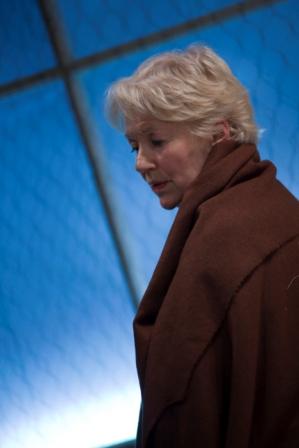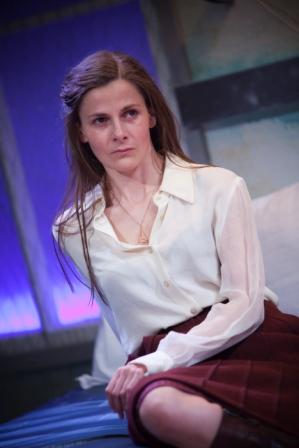The Trojan Women, Gate Theatre | reviews, news & interviews
The Trojan Women, Gate Theatre
The Trojan Women, Gate Theatre
Caroline Bird's adaptation of Euripides' tragedy sacrifices subtlety for anguish
Not even a cameo by Tamsin Greig can redeem this painful adaptation of Euripides' The Trojan Women. For an hour and a half it screams with anguish, verging at times on the parodic. The production is a puzzle. Caroline Bird has updated the language, stripping the original of much of its poetry and adding expletives.
Bird is faithful to the gist of the original, conveying the play's main point about the folly of battle. After the Trojan War, the captive women of Troy share their grief and learn about their fate as the Greeks' concubines and slaves. Women are the spoils of conflict. There's Hecuba, the fallen queen of Troy; Cassandra, her daughter; Andromache, her daughter-in-law; Helen of Troy, whose elopement with Paris caused the war; and the chorus, here played by a pregnant woman. By mixing the old (the gods) with the new (technology), Bird has created a detached world, one that is hard to understand.
 This production is framed by two bizarre cameos: the names are a coup for the Gate Theatre, but the dramatic device does not work. Greig, as Athena, the goddess of war, and Roger Lloyd Pack, as Poseidon, the god of the sea, flash up on small screens in a pre-recorded video at the start. They present a patronising prologue more suited to the classroom than the theatre. Lloyd Pack, with his sunglasses and cigarette, tells of the Greeks hiding inside a “massive rocking horse”, before Greig cuts in with “Wrap it up, Jackanory”.
This production is framed by two bizarre cameos: the names are a coup for the Gate Theatre, but the dramatic device does not work. Greig, as Athena, the goddess of war, and Roger Lloyd Pack, as Poseidon, the god of the sea, flash up on small screens in a pre-recorded video at the start. They present a patronising prologue more suited to the classroom than the theatre. Lloyd Pack, with his sunglasses and cigarette, tells of the Greeks hiding inside a “massive rocking horse”, before Greig cuts in with “Wrap it up, Jackanory”.
This jars with the rest of the play, which is all anguish and wretchedness. Dearbhla Molloy (pictured above) as Hecuba displays relentless outrage at being left “a queen without a city” and a childless widow. “What will I be now?” she wails. “Somebody's servant. Sewing the names of my enemy's children into their school shirts, arranging oven chips on a baking tray, a slave to the Greeks who massacred my people.” Molloy spends most of the time shouting. There is little nuance. Hecuba shares a room with the Chorus, a lower-class pregnant woman, who moves from despair to disorientated delirium after taking medication. The Chorus, played earnestly by Lucy Ellinson, spends much of the time crying.

The Trojan Women goes all out on such big gestures. Later a dead baby covered in blood is brought on stage. It seems to be done for shock value, but because of the flat characters it fails to move as much as it should. Christopher Haydon's direction is admirably adventurous, but scenes often become cluttered. Towards the end, one character is pointing a gun, another is shouting, another is on their knees and another is rushing in and out. It verges on the farcical.
rating
Explore topics
Share this article
Add comment
The future of Arts Journalism
You can stop theartsdesk.com closing!
We urgently need financing to survive. Our fundraising drive has thus far raised £49,000 but we need to reach £100,000 or we will be forced to close. Please contribute here: https://gofund.me/c3f6033d
And if you can forward this information to anyone who might assist, we’d be grateful.

Subscribe to theartsdesk.com
Thank you for continuing to read our work on theartsdesk.com. For unlimited access to every article in its entirety, including our archive of more than 15,000 pieces, we're asking for £5 per month or £40 per year. We feel it's a very good deal, and hope you do too.
To take a subscription now simply click here.
And if you're looking for that extra gift for a friend or family member, why not treat them to a theartsdesk.com gift subscription?
more Theatre
 The Producers, Garrick Theatre review - Ve haf vays of making you laugh
You probably know what's coming, but it's such great fun!
The Producers, Garrick Theatre review - Ve haf vays of making you laugh
You probably know what's coming, but it's such great fun!
 Not Your Superwoman, Bush Theatre review - powerful tribute to the plight and perseverance of Black women
Golda Rosheuvel and Letitia Wright excel in a super new play
Not Your Superwoman, Bush Theatre review - powerful tribute to the plight and perseverance of Black women
Golda Rosheuvel and Letitia Wright excel in a super new play
 Cow | Deer, Royal Court review - paradox-rich account of non-human life
Experimental work about nature led by Katie Mitchell is both extraordinary and banal
Cow | Deer, Royal Court review - paradox-rich account of non-human life
Experimental work about nature led by Katie Mitchell is both extraordinary and banal
 Deaf Republic, Royal Court review - beautiful images, shame about the words
Staging of Ukrainian-American Ilya Kaminsky’s anti-war poems is too meta-theatrical
Deaf Republic, Royal Court review - beautiful images, shame about the words
Staging of Ukrainian-American Ilya Kaminsky’s anti-war poems is too meta-theatrical
 Laura Benanti: Nobody Cares, Underbelly Boulevard Soho review - Tony winner makes charming, cheeky London debut
Broadway's acclaimed Cinderella, Louise, and Amalia reaches Soho for a welcome one-night stand
Laura Benanti: Nobody Cares, Underbelly Boulevard Soho review - Tony winner makes charming, cheeky London debut
Broadway's acclaimed Cinderella, Louise, and Amalia reaches Soho for a welcome one-night stand
 The Pitchfork Disney, King's Head Theatre review - blazing with dark energy
Thrilling revival of Philip Ridley’s cult classic confirms its legendary status
The Pitchfork Disney, King's Head Theatre review - blazing with dark energy
Thrilling revival of Philip Ridley’s cult classic confirms its legendary status
 Born with Teeth, Wyndham's Theatre review - electric sparring match between Shakespeare and Marlowe
Rival Elizabethan playwrights in an up-to-the-minute encounter
Born with Teeth, Wyndham's Theatre review - electric sparring match between Shakespeare and Marlowe
Rival Elizabethan playwrights in an up-to-the-minute encounter
 Interview, Riverside Studios review - old media vs new in sparky scrap between generations
Robert Sean Leonard and Paten Hughes make worthy sparring partners
Interview, Riverside Studios review - old media vs new in sparky scrap between generations
Robert Sean Leonard and Paten Hughes make worthy sparring partners
 Fat Ham, RSC, Stratford review - it's Hamlet Jim, but not as we know it
An entertaining, positive and contemporary blast!
Fat Ham, RSC, Stratford review - it's Hamlet Jim, but not as we know it
An entertaining, positive and contemporary blast!
 Juniper Blood, Donmar Warehouse review - where ideas and ideals rule the roost
Mike Bartlett’s new state-of-the-agricultural-nation play is beautifully performed
Juniper Blood, Donmar Warehouse review - where ideas and ideals rule the roost
Mike Bartlett’s new state-of-the-agricultural-nation play is beautifully performed
 The Gathered Leaves, Park Theatre review - dated script lifted by nuanced characterisation
The actors skilfully evoke the claustrophobia of family members trying to fake togetherness
The Gathered Leaves, Park Theatre review - dated script lifted by nuanced characterisation
The actors skilfully evoke the claustrophobia of family members trying to fake togetherness
 As You Like It: A Radical Retelling, Edinburgh International Festival 2025 review - breathtakingly audacious, deeply shocking
A cunning ruse leaves audiences facing their own privilege and complicity in Cliff Cardinal's bold theatrical creation
As You Like It: A Radical Retelling, Edinburgh International Festival 2025 review - breathtakingly audacious, deeply shocking
A cunning ruse leaves audiences facing their own privilege and complicity in Cliff Cardinal's bold theatrical creation

Comments
A most unfair review, I
Wow. That's a serious taste